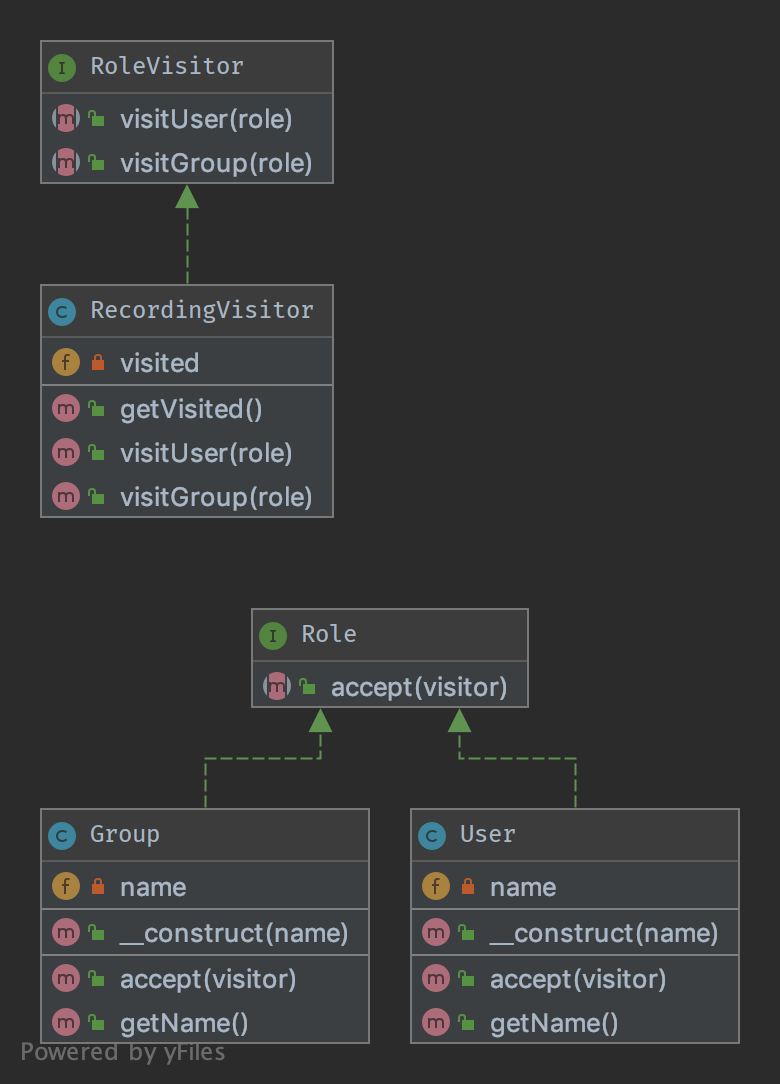3.13. Visitor
3.13.1. Propósito
El patrón Visitor le permite subcontratar las operaciones en objetos a otros objetos. La razón principal para hacerlo es mantener una separación de cometidos. Pero las clases tienen que definir un contrato para permitir a los visitantes(el método Role::accept es un ejemplo).
El contrato es una clase abstracta, pero también puede tener una interfaz limpia. En ese caso, cada Visitante tiene que elegir por sí mismo qué método invocar en el visitante.
3.13.2. Diagrama UML

3.13.3. Código
Puedes encontrar el código en GitHub
RoleVisitor.php
1<?php
2
3declare(strict_types=1);
4
5namespace DesignPatterns\Behavioral\Visitor;
6
7/**
8 * Note: the visitor must not choose itself which method to
9 * invoke, it is the visited object that makes this decision
10 */
11interface RoleVisitor
12{
13 public function visitUser(User $role);
14
15 public function visitGroup(Group $role);
16}
RecordingVisitor.php
1<?php
2
3declare(strict_types=1);
4
5namespace DesignPatterns\Behavioral\Visitor;
6
7class RecordingVisitor implements RoleVisitor
8{
9 /**
10 * @var Role[]
11 */
12 private array $visited = [];
13
14 public function visitGroup(Group $role)
15 {
16 $this->visited[] = $role;
17 }
18
19 public function visitUser(User $role)
20 {
21 $this->visited[] = $role;
22 }
23
24 /**
25 * @return Role[]
26 */
27 public function getVisited(): array
28 {
29 return $this->visited;
30 }
31}
Role.php
1<?php
2
3declare(strict_types=1);
4
5namespace DesignPatterns\Behavioral\Visitor;
6
7interface Role
8{
9 public function accept(RoleVisitor $visitor);
10}
User.php
1<?php
2
3declare(strict_types=1);
4
5namespace DesignPatterns\Behavioral\Visitor;
6
7class User implements Role
8{
9 public function __construct(private string $name)
10 {
11 }
12
13 public function getName(): string
14 {
15 return sprintf('User %s', $this->name);
16 }
17
18 public function accept(RoleVisitor $visitor)
19 {
20 $visitor->visitUser($this);
21 }
22}
Group.php
1<?php
2
3declare(strict_types=1);
4
5namespace DesignPatterns\Behavioral\Visitor;
6
7class Group implements Role
8{
9 public function __construct(private string $name)
10 {
11 }
12
13 public function getName(): string
14 {
15 return sprintf('Group: %s', $this->name);
16 }
17
18 public function accept(RoleVisitor $visitor)
19 {
20 $visitor->visitGroup($this);
21 }
22}
3.13.4. Test
Tests/VisitorTest.php
1<?php
2
3declare(strict_types=1);
4
5namespace DesignPatterns\Tests\Visitor\Tests;
6
7use DesignPatterns\Behavioral\Visitor\RecordingVisitor;
8use DesignPatterns\Behavioral\Visitor\User;
9use DesignPatterns\Behavioral\Visitor\Group;
10use DesignPatterns\Behavioral\Visitor\Role;
11use DesignPatterns\Behavioral\Visitor;
12use PHPUnit\Framework\TestCase;
13
14class VisitorTest extends TestCase
15{
16 private RecordingVisitor $visitor;
17
18 protected function setUp(): void
19 {
20 $this->visitor = new RecordingVisitor();
21 }
22
23 public function provideRoles()
24 {
25 return [
26 [new User('Dominik')],
27 [new Group('Administrators')],
28 ];
29 }
30
31 /**
32 * @dataProvider provideRoles
33 */
34 public function testVisitSomeRole(Role $role)
35 {
36 $role->accept($this->visitor);
37 $this->assertSame($role, $this->visitor->getVisited()[0]);
38 }
39}